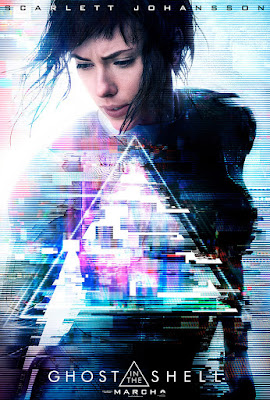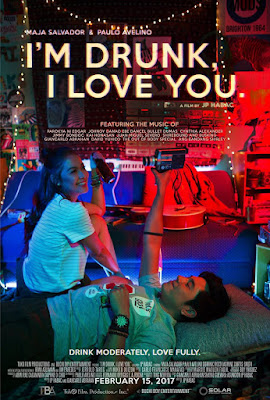GHOST IN THE SHELL (Rupert Sanders, 2017)
Whitewashing controversy aside, Hollywood's live-action adaptation of Masamune Shirow's manga "Ghost in the Shell" is a visual feast, among other things. Rupert Sanders, who will now be forgiven for the disaster that was "Snow White and the Huntsman," herein directs with a steady eye for detail. Sanders borrows some shot-for-shot iconic scenes from Mamoru Oshii's 1995 anime version, while setting up plenty of stunning images himself, through the help of lensman Jess Hall ("Transcendence"). In this new "Ghost" adaptation, 3D holograms adorn the facade of huge skyscrapers, which could be a reverse "Blade Runner" because much of the story, or at least the exterior scenes occur in daylight. Most of the visual composition focuses on circles, like the shape of Major's "apartment building" and the cemetery, which could either be a metaphor for the brain (the "ghost") or the narrative path which leads us to the very beginning.
The screenplay, written by Jamie Moss, William Wheeler and Ehren Kruger (the latter the same writer behind the terrifying "The Skeleton Key") simplifies a lot of the complex plot details of the 1995 anime, which isn't necessarily a negative. The filmmakers explain the setup briefly, which is especially helpful for audiences alien to the source material, while foregoing exposition on elements like the use of camouflage, which is clever.
Also, Sanders goes for a quicker pace that despite the longer running time, the manhunt for the puppetmaster, herein given the name Kuze (Michael Pitt) seems more urgent. This is in contrast to the anime's more contemplative tone, which would have never worked for this particular narrative route. In its defense, the anime does feature a highly-hypnotic and utterly melancholic montage guaranteed to creep you the hell out.
But what I most like about this new "Ghost" adaptation is its timeliness. Of course, the story is still about man, machines, coverups and the search for identity, but it is, most importantly, about freedom of speech. "V For Vendetta" quickly comes to mind, which ought to be a worthy companion piece. In today's age of alternative facts and fake news and digital tyranny, "Ghost in the Shell" arrives as a gentle reminder that truth is not only relevant, but necessary.
This new version also foregoes the entire Section 6 from the anime, and makes Hanka Robotics (previously Megatech Body) the sole powerful overlord that is hell-bent on control, which makes sense considering big businesses now control the government, more than ever.
Let's dig into the casting. Scarlett Johansson is pitch perfect as Major, channeling her gifts as an intuitive actress onto her character's quiet sense of bewilderment. Trapped inside her body, or "shell" and the occasional glitches, Johansson captures Major's cold demeanor above a sentimental and passionate "ghost."
As the film plays out, Johansson's casting makes more sense. One might even call "Ghost in the Shell" a self-mockery, or how Hollywood whitewashing has become a pervasive subculture. Yet in this film, the narrative justifies the casting because the major plot spoiler in Act Three is a lurking metaphor of the damn issue.
Pilou Asbæk, who played Euron Greyjoy in "Game of Thrones" is Batou, Major's trustworthy teammate. Here, we see how Batou develops his unique cybernetic vision, which isn't really a big deal, but still. A new character, Dr. Ouelet is introduced, and is impeccably played by acclaimed actress Juliette Binoche. As the doctor with a conscience, Ouelet could have been another caricature in the hands of a lesser actress, but Binoche exhibits palpable empathy, which makes her character's plight compelling.
However, the most badass character in the entire movie has to be Chief Daisuke Aramaki, played with calculated experience and ruthlessness by veteran actor and filmmaker Takeshi Kitano. Kitano, who refuses to utter one word of English because he's such a badass, runs anti-terrorist bureau Section 9 with a terrifyingly quiet demeanor. But when pushed to the wall, do not f****** send a rabbit to kill a fox, like he says.
Starting out first as a whodunit manhunt and ending as a vengeance thriller, "Ghost in the Shell" may not be groundbreaking or trailblazing in the Sci-Fi genre, yet to its merit, it is a completely different animal from the anime version, and that distinction has worked to its advantage as a pulpy, popcorn flick with something urgent to say. Despite the backlash and the dismal box office returns, "Ghost in the Shell," in my opinion is one remarkable remake that justifies its creation.
RATING: 4/5


Comments
Post a Comment